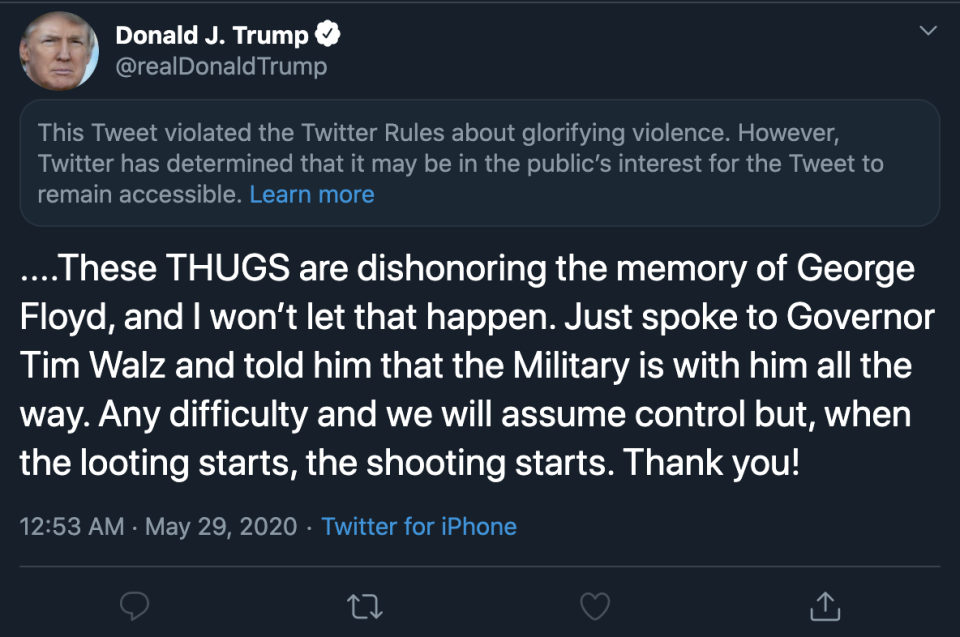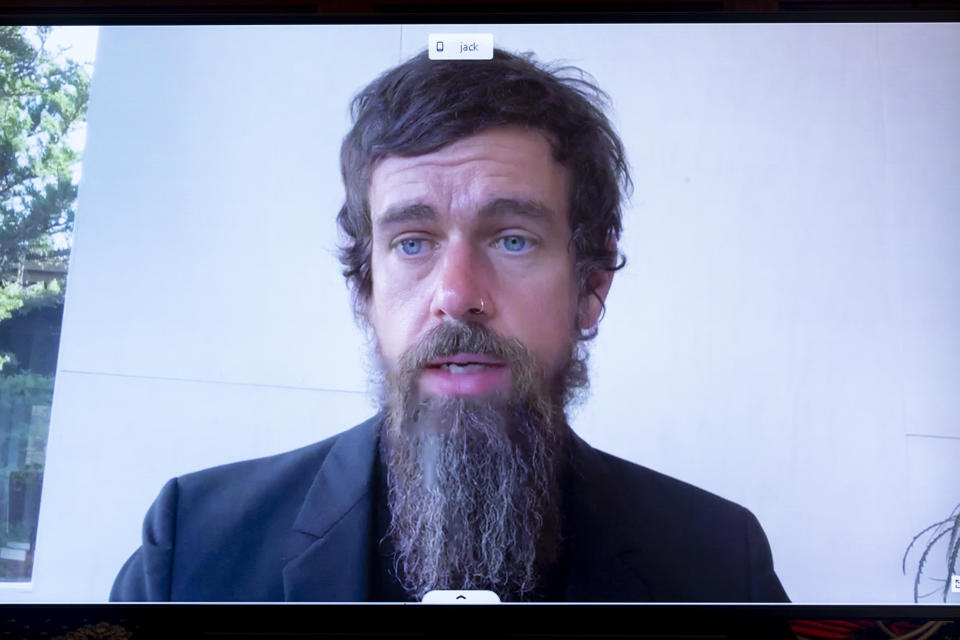Facebook, Twitter, and Google need to answer for disinformation — not a fake anti-conservative bias
Wednesday, October 28, 2020
This article was first featured in Yahoo Finance Tech, a weekly newsletter highlighting our original content on the industry. Get it sent directly to your inbox every Wednesday by 4 p.m. ET. Subscribe
Lawmakers accuse tech giants of silencing conservative voices
Facebook (FB) CEO Mark Zuckerberg, Google (GOOG, GOOGL) CEO Sundar Pichai, and Twitter (TWTR) CEO Jack Dorsey sat before the Senate on Wednesday, ostensibly, to testify about an internet law that protects websites from liability for content that users post.
But the hearing quickly devolved into accusations by Republicans that the internet giants silence conservatives, despite a lack of any solid evidence to support such claims.
“The three witnesses we have before this committee today collectively pose, I believe, the single greatest threat to free speech in America, and the greatest threat we have to free and fair elections,” Senator Ted Cruz (R-TX) said during the hearing before the Senate Committee on Commerce, Science & Transportation.
Cruz and the committee’s other Republicans cared little about the real problem with these tech platforms — the rampant spread of falsehoods via their apps and services.
Sign up for Yahoo Finance Tech newsletter
To be sure, Facebook, Google, and Twitter have each taken steps to stop everything from lies about the ongoing coronavirus pandemic to bogus claims of voter fraud in the 2020 election. However, the sheer size of these companies and content policies continue to allow them to act as fire hoses for falsehoods.
Anti-conservative bias is an old, tired story
For the past few years, conservatives have complained of perceived political bias by the likes of Facebook, Google, and Twitter. Most conservatives have pointed to their own platform policy violations or anecdotal experiences as supposed proof of some wide-ranging conspiracy.
Trump himself broke Twitter’s terms of service when he claimed that mail-in voting would result in a “rigged election.” He also broke those terms when he tweeted “when the looting starts, the shooting starts” following protests over the death of George Floyd, a Black man who died when a police officer in Minneapolis knelt on his neck for nearly 9 minutes.

Despite those violations, social media has amplified conservative voices. Facebook even allowed conservative news sites and personalities to avoid penalties for violating terms of service out of fear that the social network would be called biased, according to an NBC News investigation published in August, citing internal leaked documents.
But a look at Facebook’s CrowdTangle tool, which provides information on the most interacted with pages on the social network, tells a different story. Trump’s page, for example, has seen 139 million interactions (likes, comments, etc.) on 739 posts over the last month, while Joe Biden has had 20 million interactions on 360 posts.
What’s more, right-wing outlets Fox News and Breitbart have the most Facebook interactions among 64 U.S. media organizations over the last seven days as of Monday, with 17.89 million and 9.65 million interactions, respectively. CNN had the third most interactions with 4.5 million interactions followed by NBC News and BBC News.
Twitter, meanwhile, has become Trump’s tool for addressing Americans, whether he’s explaining why he fired former FBI director James Comey, or announcing his discharge from Walter Reed Medical Center after being infected with the coronavirus. He is also, arguably, Twitter’s most important user with 87 million followers.

But the bias narrative has become so widespread that now, according to a recent Pew Research survey of 4,708 American adults, 73% said it is somewhat or very likely that social media sites censor political viewpoints they disagree with.
More recently, conservatives have jumped on Twitter and Facebook for limiting the spread of a New York Post article that claimed to have emails from Joe Biden’s son, Hunter Biden, linking the former vice president to business dealings in Ukraine. But that same article was met with intense scrutiny because the source of the emails was unknown.
Stopping disinformation is far more important
Despite no definitive proof of bias, conservatives including Trump have seized on the momentum they have built to go after Facebook, Twitter, and Google by seeking to rewrite Section 230 of the Communications Decency Act.
Section 230 allows online platforms to make “good faith” decisions about removing content they find objectionable while protecting them from legal liability for doing so.
Conservatives, however, aren’t the only ones looking to change Section 230. Democrats in Congress are also trying to alter the law to hold online platforms accountable for helping disseminate lies and false information to their billions of users.
And unlike claims of bias, disinformation and misinformation spread at an alarming rate over social media, as evidenced by a 2018 study in the journal Science finding false news spreads farther and faster than facts across Twitter.

Bill Gates, co-founder of Microsoft and chair of the Bill and Melinda Gates Foundation, told Yahoo Finance Editor-in-Chief Andy Serwer during Yahoo Finance’s All Markets Summit that he fears disinformation online could stop people from receiving coronavirus vaccines.
“The wave of wild stories about the vaccine, that it's, you know a conspiracy, it's on based evil intent, often referring to either myself or Dr. Fauci that is a wild new element that I wouldn't have expected,” Gates said, referring to Anthony Fauci, the nation’s top infectious disease specialist.
And while social networks have removed such content, Nina Jankowicz, a disinformation fellow at the Wilson Center, told Yahoo Finance’s On the Move last week that doing so hasn’t been a priority.
“The platforms are making perhaps not a fully good faith effort. A lot of this is about PR wins for them and saying that they're taking down content from foreign interference when, you know, we know that there is more out there,” she said.

The results? According to Bloomberg, a recent study by SurveyUSA found that 65% of 3,000 registered voters reported encountering political disinformation in their Facebook feed. And according to The Guardian, engagement with anti-vaccine posts has tripled among Facebook users in the U.K.
And those types of disinformation can lead to everything from Americans not wearing masks to fend off the coronavirus pandemic to real-world violence including armed militias taking to the streets of Kenosha, Wisconsin following the killing of Jacob Blake, a Black man who was shot in the back by police.
And, of course, Russia, China, and Iran have tried to sow discord among Americans by spreading misinformation in the U.S. The issue came to a head when it became clear that Russian actors sought to influence the outcome of the 2016 election. And the same groups are seeking to do the same in the 2020 election.
So while conservative politicians waste time crying foul about a nonexistent problem, they’re letting the real issue slip through their hands — and they’re failing the American people at a critical time.
By Daniel Howley, tech editor. Follow him at @DanielHowley
More Tech News
What is Section 230, the controversial internet law Trump wants to dismantle?
Microsoft Q1 2021 earnings beat expectations on cloud strength
Here's why T-Mobile is getting into the TV business
Electronic voting will become 'fraud proof' and it will prompt more people to vote: Adobe CEO
These tech jobs may disappear in the face of automation
Review
Apple’s iPhone 12 is all about the cameras — iPhone 12 review
—
Read the latest financial and business news from Yahoo Finance
Follow Yahoo Finance on Twitter, Facebook, Instagram, Flipboard, LinkedIn,YouTube, and reddit.

